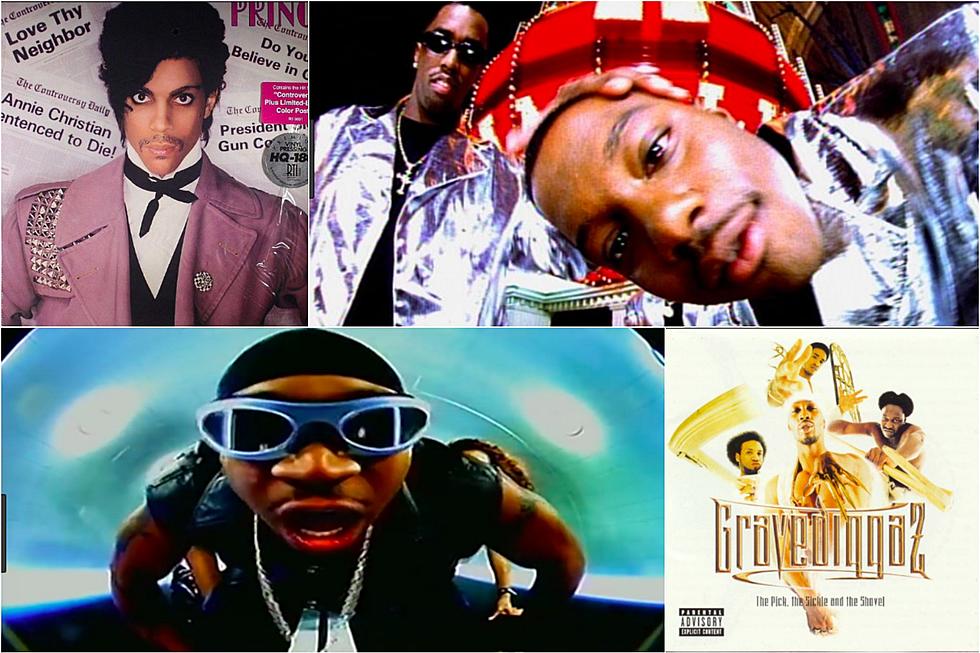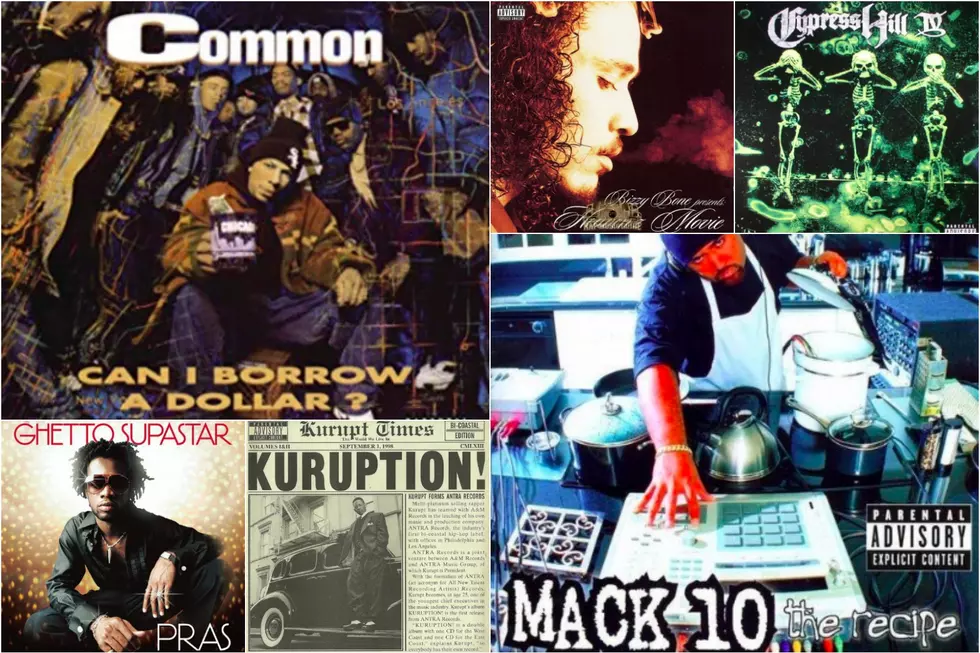
Eazy-E Clowns Dr. Dre: Oct. 19 in Hip-Hop History
On this day in hip-hop history, Prince dropped his second album, Black Moon debuted, Erick Sermon went solo, Eazy-E released a scathing Dr. Dre diss, MeShell Ndegeocello created a new soul standard, U-God and Pharoahe Monch made their solo debuts and Bizzy Bone continued to explore his spirituality.
1979: Prince releases his self-titled sophomore album
In 1979 the world was further introduced to Prince Rogers Nelson via his self-titled sophomore album. The platinum-selling record was written, performed and produced entirely by the music icon, and featured one of his staples, "I Wanna Be Your Lover." The album came just before his music would take a turn with 1980's Dirty Mind and 1981's Controversy.
"I was well known starting out, we had a great band and every time we played, we got better," he told The Guardian in 2015. "We also had studio work, so the more we recorded the better we got. This is what you’ve got to do, and if you’ve got great folk around you and a good teacher, you’re going to excel at it."
1993: Black Moon drops Enta Da Stage
Black Moon dropped their acclaimed debut, Enta Da Stage, in 1993, produced by DJ Evil Dee and Mr. Walt of Da Beatminerz. Serving as an entry point to the direction of mid-'90s East Coast rap, the album spawned two singles that performed moderately well on the charts, "Who Got da Props?" and "I Got Cha Opin" propelled by the lyrical skills of Buckshot.
"Enta Da Stage was really rough for me. It was a really rough era," he revealed in a 2005 interview. "A lot of people don't know what I went through personally. I think I had just turned 18 and I had the pressure of running a management company as an 18-year-old shorter than 5'6. I had that problem of people taking my company and my representation seriously. So a day in the life around the Enta Da Stage era was based on constant struggle and lettin' people know you respect Duck Down management as a real management company and not just as some little cute thing that Buckshot is doing. Nah, for real, we're management type deal. I was battling keeping Smif N' Wessun in a good deal, I was battling trying to get Heltah Skeltah a good deal. I was battling trying to bring my record company into existence, so it was a really hard time."
1993: Erick Sermon goes solo
Erick Sermon dropped his solo debut, No Pressure, in 1993 following his success as half of groundbreaking group EPMD. The 17-track project hit No. 16 on the Billboard 200 and peaked at No. 2 on the R&B Albums chart, led by the singles "Hittin Switches" and "Stay Real." Featuring Ice Cube as well as Keith Murray and Redman—whom Sermon had produced extensively—the album further demonstrated Sermon's funk sound, which expanded beyond coast lines.
"When I first came out in 1988 I was in Germany the same year," he told The Source in 2014. "That is how influential records were. The reason people over seas still love hip-hop is because they love the culture. The culture itself is fun, the elements of hip-hop are rapping, graffiti, break-dancing, DJing, fifth element is beat-boxing. The whole fun part is the culture as a whole."
1993: MeShell Ndegeocello changes the game with her debut
MeShell Ndegeocello helped usher in the new soul era with her game-changing entry into music, 1993's dark, velvety Plantation Lullabies, which was released on Madonna's Maverick Records. The bassist/singer/producer/songwriter's skills were on sharp display throughout the layered 13-track project, particularly on tracks like "Outside Your Door." Considered ahead of her time, Ndegeocello's debut is considered a landmark album in emergence of the new soul movement that was later defined by artists like Erykah Badu, D'Angelo and Maxwell, whose music often drifted into the socio-political positioning of black people while exploring the nuances of life and love. Case and point, Ndegeocello's first single, "Dred Loc" was about black hair, a topic that still resonates today. She spoke in 2018 about her brief working relationship with Madonna when her album debuted.
"We had a very simple, quick relationship," she said. "I love her. There are five people I have to thank for being able to do this, for having a career, and she’s one of them. She took a chance. I had a chance to sign with her or Prince and I signed with her. That first record is a true expression of everything I wanted to do. How many people can say that?"
1993: Eazy-E responds to Dr. Dre's The Chronic
A response to Dr. Dre's juggernaut album, The Chronic, Eazy-E's It's On (Dr. Dre) 187 Killa was the rapper's second EP. The most notable song from the eight-track offering is the diss "Real Muthaphuckkin G's," where Eazy-E comically took aim at Dr. Dre following Dre and Snoop Dogg's brutal diss on The Chronic's "Dre Day." "I never met an OG who never did shit wrong/Try and diss Eazy-E now nigga it's on," Eazy raps on the track, before declaring Dre "ain't worth a food stamp." The project peaked at No. 5 on the Billboard 200 and went double platinum. Eazy died due to complications from AIDS just two years later, in 1995, by which time, he and Dre had made amends.
“We would probably be working together right now," Dr. Dre told The Hollywood Reporter in 2015 of Eazy's untimely death. "[We would probably be] arguing about the work, as we did back in the past. It’s like, every project, we had some little argument about what the project should be creatively, and I would say we would probably still be doing that, but at the same time getting the work done and probably doing something amazing.”
1999: Dan the Automator and Prince Paul form Handsome Boy Modeling School
Longtime friends, producers Dan the Automator (Gorillaz, Dr. Octagon, Deltron 3030) and Prince Paul (Stetsasonic, De La Soul, Gravediggaz), connected musically in 1999 to form Handsome Boy Modeling School and release So... How's Your Girl? The 16-track album was entirely produced by the duo with the exception of one track, and generally received good reviews when it was released. They explained the concept for the group in a 2004 interview with The Guardian.
"You ever see that '60s television show Batman? Crime happens in the city and the commissioner throws up the bat signal and all of a sudden Batman shows up, jumping through the window? It's kind of like that," Dan the Automator explained. "The handsome signal goes up and the handsome people come around."
1999: U-God drops Golden Arms Redemption
Wu-Tang Clan's U-God came through in 1999 with his solo debut, Golden Arms Redemption. The 15-track project boasted the single that was used for for the Wu-Tang Shaolin Style video game, "Rumble." Another single, "Bizarre," found success, hitting No.7 on the Hot Rap Singles chart. Inspectah Deck, Method Man and Raekwon show up to help their Wu brother out on the album, which came out just before Priority Records shut down. U-God, who released a memoir, Raw: My Journey Into the Wu-Tang in 2018, spoke about finding his voice on those early records.
"It took me a long time to like my voice," he explained. "Because I didn’t know how to control it. I was like Cyclops from X-Men, when he got the eye thing on, ’cause he didn’t know how to control his eye beams. And he kept blowing shit up until he found out how to control his shit. That was me. I had to learn to control my voice — how to make it go deeper. But then I’d get down [gives a sample of a super-deep voice] and be like, 'I’m too fucking low.' I had to learn to keep it up to a certain tempo when I rhyme. That’s what happened when 'Winter Warz' took place. I found that. I said, 'Oh shit! I get it. Now I understand it.' I was cheating my tone, right here. Now I can sit in my tone like sipping water. I can go from speed, slow it down, jump in. I can do it all so much right now."
1999: Pharoahe Monch releases his solo debut
Pharoahe Monch dropped his solo debut, Internal Affairs, in 1999. Previously finding success as a member of Organized Konfusion, Monch's debut birthed the Hot 100 hit "Simon Says," and further showcased his lyrical brilliance. His complex rhymes and perspective was explored on his 15-track solo debut, which also featured appearances from Busta Rhymes, Talib Kweli, M.O.P. and Common among others. The Alchemist, Diamond D, DJ Scratch and Lee Stone produced the bulk of the project, which hit No. 6 on the Top R&B/Hip-Hop Albums chart.
" I look back on my records as my babies," he told HipHopDX. "After Internal Affairs, Desire was a little weird for people because it was soulful and whatever. But recently I asked people online about that record and a lot of people gravitated towards it. I was like, 'Damn.' But then you realize that there are new people who are 18 and 19, and there will be new 18, 19 to 24 years olds who grew up on it and were loving it because it’s theirs. When I look back at Organized Konfusion, the zone that I was in at that time, I just shake my head. There were just bangs and rhythms, beats and lyrics on those records, and I’m like, 'Jesus, this dude would rip you apart right now.' (Laughs) This muthafucka was really into crafting these flows that he was into at that time. When I put it in perspective, it’s mind blowing. I’m not an artist at the top of the charts or any of that now, but I have my fan base that I work with. But once you lose that one thing that people respect you for, then it’s wrap."
2004: Bizzy Bone returns with Alpha and Omega
Bizzy Bone dropped his third solo album, Alpha and Omega in 2004, pushed by the lead single, "I Understand." The album, which explored spirituality and his concept of life and death, charted on the Billboard 200 and hit No. 27 on the R&B/Hip-Hop Albums chart.
"The meaning behind Alpha & Omega is just keeping it spiritual and keeping it centered around a spiritual aspect," he explained in a 2004 interview. "It's the beginning and the end, the first and the last. We always represent God and I always represent God. Even through the midst of the Ouija board songs and the paint on the faces, and looking at stuff backwards in the mirror on the album. Which is something I never agreed to. I gotta make my stance and I gotta make my statement. I am very spiritual, and the whole album is revolved around spirituality."
More From TheBoombox









